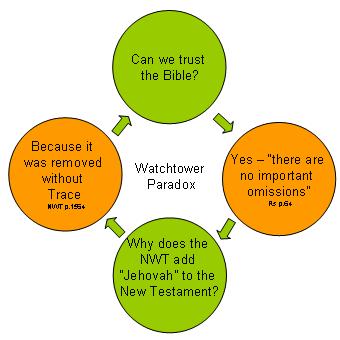Hi Slim,
"Conspiracy theory? That seems to be the go to, discrediting label these days, doesn’t it?"
That the divine name was in the earliest manuscripts of the New Testament is a theory...since it does not appear in one of the thousands of ancient manuscripts. Now if a bunch of Trinitarians or some other group in the second century plotted to and removed the divine name from all existing manuscripts that would certainly qualify as a conspiracy. So conspiracy theory readily fits the bill.
So the fact is that there is no proof the the divine name was in any ancient Greek NT manuscript and there is no proof of a conspiracy to remove the name. So my take is that a real conspiracy took place in the offices at headquarters in Brooklyn when a group of men made it their aim to insert the divine name into the Greek NT 237 times to fit their theology where the evidence says it does not belong, rendering the New Testament unreliable.
JWfacts has this to say on the subject:
Several available manuscripts date back to this period. P47 dates prior to 300 A.D. and contains four uses of Kyrios from Revelation that the NWT translates as Jehovah. P66 dates from around 200 A.D. from John (written in 98 A.D) and contains five occurrences of Lord that appear in the NWT as Jehovah. Some manuscripts go back to within 25 years of John's writings, yet none contains YHWH.

Evidence it did not Appear
There is much evidence that YHWH never appeared in the New Testament. Most obvious is the absence of YHWH in any of the 5,000 discovered Greek New Testament manuscripts.
Important evidence is also contained in the writings of the early Christians. These are referred to as the Apostolic Fathers and Ante Nicene Fathers who wrote from the times of the Apostles to the third century. This includes Polycarp, who studied with the Apostle John and Justin Martyr who lived from 110 to 165 A.D. Their extensive writings are a source of information on the early Church, including the formulation of the Trinity doctrine and the development of the Bible Canon. Yet in their writings there is no discussion about the removal of God's name from the Scriptures. If a global conspiracy existed to remove YHWH from the all New Testament manuscripts debate most certainly would have occurred between these writers.
Furthermore, their works do not contain YHWH when quoting from New Testament Scriptures. For example, in Against Heresies, Irenaeus quotes Matthew 1:20; 4:10 and Romans 11:34, each time using the word Lord instead of Jehovah. Clement, mentioned at Philippians 4:3, wrote the Epistle of Clement to the Corinthians between 75 and 110 A.D. and used Kyrios when quoting from the Old Testament. (See 1 Clement 13:5 which quotes Ezekiel 33:11.)
Justin Martyr converted to Christianity around 150 A.D., a mere 50 years after the Bible was completed. He had access to early copies of the New Testament yet in The Second Apology, Chapter VI he wrote;
"But to the Father of all, who is unbegotten, there is no name given. For by whatever name He be called, He has as His elder the person who gives Him the name. But these words, Father, and God, and Creator, and Lord, and Master, are not names, but appellations derived from His good deeds and functions."
Justin Martyr shows that Christians referred to the Father by appellations, but not a name such as Jehovah.
